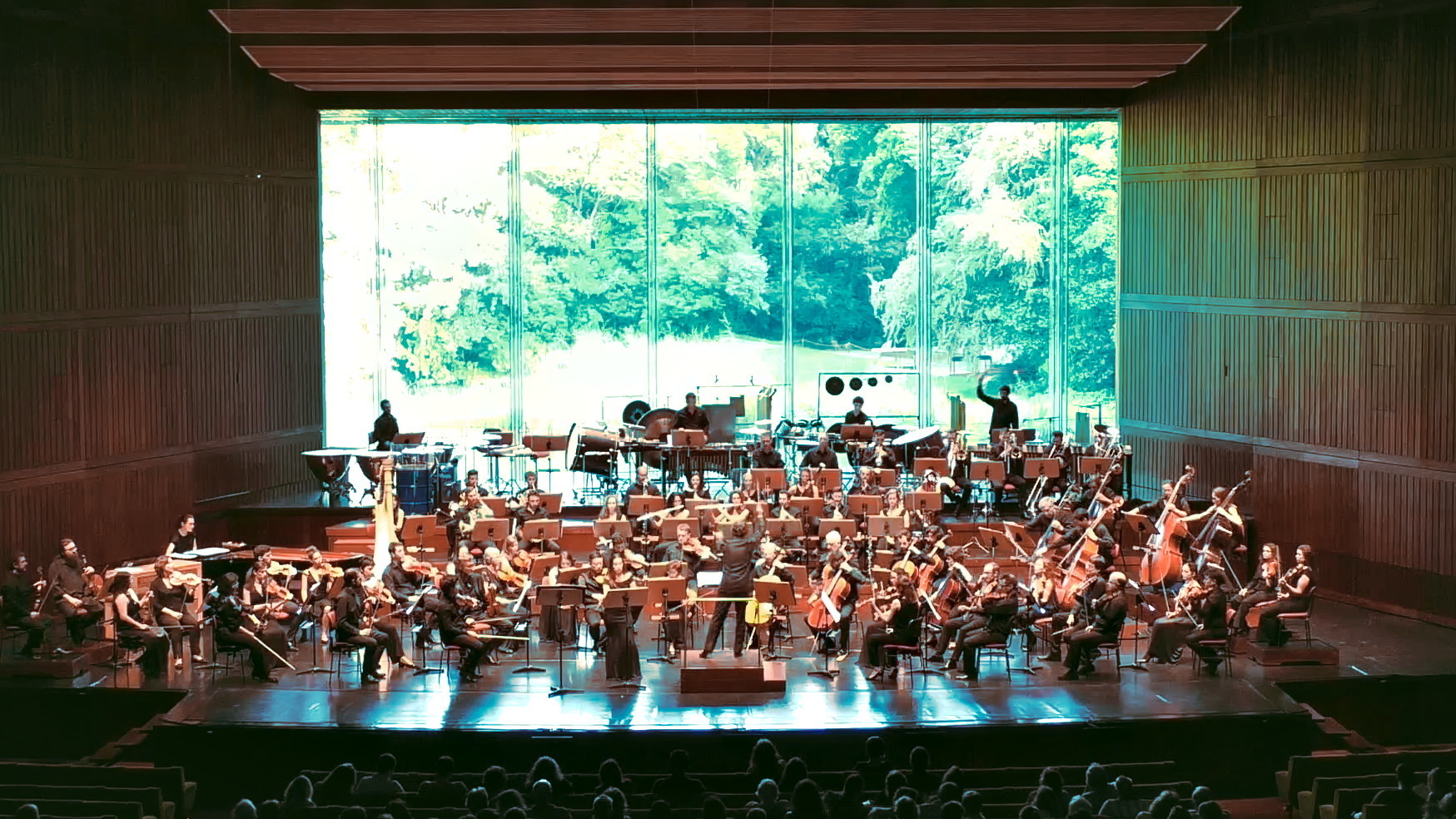
L'envie de rire
for soprano and orchestra
Premiered July 13, 2019
Grande Auditório da Fundação Calouste Gulbenkian, Lisboa
Orquestra Gulbenkian, cond. Pedro Neves
Lara Martins, sop
In Greek the act of love is a mingling (mignumi) and desire melts the limbs (lusimelēs [...]). Boundaries of body, categories of thought, are confounded.
Anne Carson, Eros the bittersweet
É ir buscar à irracionalidade do corpo, do inconsciente e do desconhecido a intensidade do sentido que torna inteligível um acontecimento, um comportamento, uma ideia. A intensidade não é extrínseca ao pensamento, pelo contrário, pensar é pensar excessivamente, intensamente.
José Gil, Caos e ritmo
J’ai consulté hier un dictionnaire voulant connaître la hauteur de la atmosphère: la colonne d’air dont nous devons supporter le poids ne serait pas inférieure à dix-sept tonnes.
Georges Bataille, Le coupable
Le coupable — “guilty”, as well as “cut” or “cuttable”, from the French couper — is a self-portrait of the French writer Georges Bataille.
One could call it a portrait because, unlike in autobiography, no life story predating the act of writing unfolds in its pages. The book was penned between September 5th 1939 and October 1943. On September 1st, Germany had invaded Poland, formally signaling the start of the Second World War. “La date à laquelle que je commence d’écrire (…) n’est pas une coïncidence.”, writes the author. “Je commence en raison des événements, mais ce n’est pas pour en parler.” In it, the author inscribes not so much memories, but rather thoughts that procure him in his countryside refuge, having fled Paris. But these writings do not take the form of a diary or an epistolary novel: any narrative or chronological continuity is disregarded in favor of a collage-like assembly of themes, with mystical reflections flaring up between descriptions of his day-to-day — and vice versa —, in an edifice not unlike Fernando Pessoa’s Livro do desassossego (The Book of Disquiet).
Over the course of the text, battles are fought between the subject and language, as well as between the limits — in the sense of extremes, but also regarding their edges and liminal spaces — of both, which blur and lacerate as much as the warring world beyond Bataille’s isolation. Written while in profound solitude, we cannot even be sure that Le coupable is truly a book: although later published, the negligence in the production of the manuscript incurred by Bataille seems to point instead towards a more urgent kind of project, one of more vital importance than simply producing a book, in the most prosaic meaning of the word.
In the words of Denis Hollier, Le coupable is “simultaneously distracted and rigorous transcription, communication, and recognition of what isn’t recognizable. The unimportance, the insignificance of what is recognizable. The experience of what’s lost in communicating”. Bataille himself — albeit a prolific author at that point — admits being fearful of the moment in which those lines can be read by someone who knows him. For those who know Bataille’s remaining production – particularly the works of fiction –, that fear of letting oneself be recognized as a subject in such comparatively prosaic lines of text seems, at first sight, laughable. But the writing contained in this book is perhaps especially diaphanous, on account of showing no willingness whatsoever towards interacting with the stylistic or formal tropes from fiction or essay. Thus, perhaps, it points directly towards the subject that wrote it.
Throughout the text — nakedly personal and written under such terribly difficult conditions; this is a “book violently dominated by tears (…), violently dominated by death” — runs a questioning and somber undercurrent. Bataille, however, does not forego laughter. “Rire de l’univers libérait ma vie. J’échappe à la pesanteur en riant. Je me refuse à la traduction intelectuelle de ce rire: l’esclavage recommencerait à partir de là”. Laughter is, in fact, privileged, even in a terrible time in the course of the author’s life as well as the world’s. Everything else is questioned and peered — and Bataille is naught but a questioning being: “Le développement ultime de la connaissance est celui de la mise en question“.
Laughter, however, stands alone beyond the limits of this fundamental questioning act. And it is, indeed, a difficult philosophical question, laughter. Few tried to interrogate it, and for good measure: according to Adriana Cavarero (in For More than One Voice: toward a philosophy of vocal expression), Philosophy harbors the affinity towards “an abstract and incorporeal universality, and by the dominion of a Word that does not leave any throat made of flesh.” Laughter, being itself a vocal emission that, by definition, escapes semantic articulation, immediately affirms the singularity of the voice — of a voice, in a specific body, like the contents of Le coupable seem to point directly towards the innermost of its author.
Because it escapes language, and because it leans on an embodied acoustic signal, we can easily trace a line between laughter and music. From the age-old melismatic enunciation (ornamental, in oral music, then made structural, in written music) up to the more recent fragmentation of text in its phonetic components, vocal music — from our tradition or otherwise — has always thrived on the insurrection of the voice against its seemingly natural condition as the remainder or neutral carrier of speech. The ideal voice of song thus acts “not so much as a means of oral communication and transmission, but as the register of an economy of impulses connected to the rhythm of the body, destabilizing the rational register in which the system of speech depends” (Cavarero).
A bataillian vocal and musical expression would then be one where the sensation of body systematically pervades the linguistic (in its broadest meaning: the signifying structure, the symbolic, writing, the practice of cultural codes of genre or style), opening up spaces for the articulation of ephemeral structures that are not (conventionally) signifying.